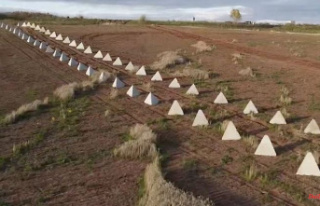The energy crisis resulting from the Russian war of aggression against Ukraine has given the energy transition in Germany new impetus. Green electricity production has legal priority. This message should now also reach the planning authorities in Mecklenburg-Western Pomerania.
Schwerin (dpa/mv) - The state government is now also fighting the backlog of approvals for the expansion of renewable energies in Mecklenburg-Western Pomerania within the authorities. In a joint letter from the Ministry of Economics and the Environment, the Offices for Regional Planning and the Environment are warned to implement the amended federal laws consistently. "The basic prioritization in favor of renewable energies expressed in paragraph 2 of the EEG means a fundamental, new legislative course," says the letter signed by the state secretaries Ines Jesse and Elisabeth Aßmann, which is available to the German Press Agency.
In it, the authors quote from the amended Renewable Energy Sources Act (EEG): "The construction and operation of systems and the associated ancillary systems are in the overriding public interest and serve public safety." According to the will of the legislature, the particularly high weight of renewable energies must be taken into account in the event of a consideration and should only take a back seat to concerns such as monument protection or nature conservation, building or road law in exceptional cases, the letter says.
Johann-Georg Jaeger, Chairman of the State Association for Renewable Energies (LEE MV), believes that an about-face in the approval authorities is long overdue. "For years, the authorities have been trained to work in an exit-oriented manner. In cases of doubt, a decision was made against the project for fear of lawsuits against wind turbines," states Jaeger. In addition, proceedings were unnecessarily drawn out because opponents kept coming up with new reasons, which in turn led to lengthy investigations.
Jaeger cited bird protection as an example, with which the designation of new areas for wind farms in the Northwest Mecklenburg planning region had been delayed. It is important to weigh impartially between the benefits of green electricity, which is indispensable in order to become less dependent on energy imports and to achieve climate goals, and real disadvantages for the bird world. "Although a few wind turbines are already turning in the country, the number of white-tailed eagles is increasing and the Red Kite is also developing," says Jaeger.
The Green member of the Landtag, Hannes Damm, certifies that the authorities in the state have "a devastating interim result" in the expansion of wind power. Only over a third of the applications submitted since 2015 have been decided so far. "190 procedures with a total of more than 800 wind turbines are still open. There are currently more than 4 gigawatts of renewable wind energy - which corresponds to the output of four coal or nuclear power plants - in the literal backlog of approvals," complained the opposition politician.
With an average of 38 months, the processing time in Mecklenburg-Western Pomerania is significantly longer than the national average. Damm calls for more staff in the responsible authorities for faster processing. In addition, the state should follow the example of Schleswig-Holstein and immediately bring wind energy planning, which is currently still the responsibility of the four regional associations, to the state level.
Economics Minister Reinhard Meyer (SPD) has already considered this in view of the enormous planning backlogs. So far, however, he has shied away from open confrontation with the municipal associations and is counting on the effect of the new laws. "The federal government is giving us tailwind with the amended Renewable Energy Sources Act, the Onshore Wind Act and the Offshore Wind Act. We now have a legal priority for renewable energies. It has to be implemented quickly." , urges the minister to hurry. The joint letter from the Ministry of Economic Affairs and the Environment is "an aid" for the employees in the responsible authorities in order to be able to apply the new legal situation appropriately.
After talks with the municipal associations, Meyer had announced a decision for October as to where the journey would go. The first changes have already been initiated. In the area of solar systems, there is a four-week period for those involved in the proceedings, said Meyer. If the statement is not available by then, this is considered approval.
The expansion of renewable energies, in particular the use of wind power, had drastically declined in Mecklenburg-Western Pomerania in recent years. According to surveys by the consulting company Windguard, only 30 megawatts of wind energy capacity were added in the north-east in the first half of 2022. In the neighboring state of Schleswig-Holstein, which is the leader in Germany with 233 megawatts of net new construction, it was many times over in the same period. According to the Economics Ministry, 1,847 wind turbines with a total output of 3,524 megawatts were installed on land in Mecklenburg-Western Pomerania at the end of last year. From the current 0.8 percent, the state area designated as wind suitability areas is to increase to 1.4 percent by 2027, and to 2.1 percent by 2032.












